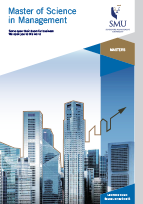
SMU Lee Kong Chian School of Business Social Media Team
It’s the best of both worlds: Learning in your own way and time, from just about any location with a Wi-Fi connection; melded with the unparalleled benefits of face-to-face networking and discussions. Blended learning is not just a breakthrough taking place somewhere in the future, it is an approach adopted right now by more innovative educators the world over, with programmes combining online resources and interaction together with more familiar campus-based learning.
Before mandatory working from home unleashed a torrent of viral memes and Zoom happy hour with colleagues became a “thing”, Alessandra Neill was already acquiring new competencies in innovation management via high-tech learning experiences. She realised innovation was not just at the forefront of the curriculum when she embarked on SMU’s Master of Science in Innovation (MI) programme but also in how the content was delivered; a number of her MI modules were conducted via Insendi, a learning experience platform that SMU has adopted for delivering its pioneering experiments in blended learning.
“I learned the types of video content, lengths and activities that were most conducive to online learning for me,” adds Alessandra, a Senior Innovation Manager at LumenLab. “Some subjects were a more natural fit for the Insendi platform, whereas for others, I relied on the live lessons to understand concepts.”
With digital disruptions heralding the need for lifelong learning, state-of-the-art e-learning solutions are integral to the future of business education. This year, the Lee Kong Chian School of Business (LKCSB)’s blended Master of Science in Management (BMiM) programme is offered on a blended learning basis — a hybrid model that fuses online learning with interactive, seminar-style pedagogy. The programme is designed to tap upon the advantages of digital technology with the convenience of studying at one’s own pace — opening the doors to busy working professionals who otherwise may not have had the opportunity to upgrade their skillsets.
“As a morning person, I’ve also been able to chip away at classes before work so I can be more present for my husband in the evenings,” adds Alessandra, who continued to work full-time during the MI post-graduate programme.
“Most importantly, blended learning has allowed me to continue my study without missing important family and work commitments both in Singapore and abroad. I’ve been able to complete Insendi classes from the couch, on the MRT, inside a Sri Lankan safari, surrounded by Australian vineyards, overlooking the Shinjuku crossing and on a Greek island.”
A GROWING MARKET
The increasing ubiquity and sophistication of technological infrastructure is a major driving force for the growing feasibility of blended learning. Richard Smith, Professor of Strategic Management (Practice) and Deputy Dean (Programmes) at SMU’s Lee Kong Chian School of Business (LKCSB) says, “with the rising popularity of social media and online communication in recent years, people have developed a sense of trust in both the infrastructure and online relationships. With recent advances in technology applications and reliability, we can replicate the classroom environment, and improve the student learning experience.”
Advances in technology also mean that geographical distances are less of an obstacle now. “With globalisation, people want to benefit from great education wherever it is offered, and not be bound by geographical location. Blended and online programmes enable that,” says Pascale Crama, LKCSB’s Academic Director of Blended Programmes and IE-SMU Master of Business Administration, and Associate Professor of Operations Management.
BUILDING A RESILIENT BUSINESS FRAMEWORK
Furthermore, blended learning builds the mindset required to thrive and succeed in the perennially disrupted business world of today — such as a shift towards self-paced productivity and the use of online tools as a means to upgrade oneself and conduct business.
For instance, John Davison, the CEO of Zuellig Pharma and a member of LCKSB’s Advisory Board, says that his company recently cancelled its regional leadership training programmes for the next few months due to the coronavirus situation. “Had we already mastered blended learning, we could have fallen back on this option to replace physical meetings. This is something we will definitely develop for the future.”
A hybrid model will be useful even after the pandemic is resolved, he believes. With operations in 13 countries across Asia, Zuellig Pharma wants to provide quality training for its personnel in all these locations; leveraging online technology will broaden their access to training considerably. Indeed, Professor Crama believes that business education is a great fit for the flexibility of blended programmes, which enable students to continue working as they learn. “This means learning and doing can be simultaneous, with immediate application of the skills learnt in class to the workplace.”
That’s exactly the rationale behind SMU’s blended learning model for its Master of Science in Management (MiM) programme. Commencing in July 2020, this programme is for busy working professionals who want to obtain a postgraduate education while continuing to pursue full-time careers.
The 18-month programme will comprise 13 to 15 days of face-to-face interaction at SMU’s city campus, with online learning (such as video-conferencing, pre-recorded lectures and web-based discussions) making up the rest of the programme.
SCHOOL OF REALITY
Wanting to continue working while furthering one’s education isn’t just a matter of being an overachieving multi-tasker. In the real world, myriad considerations may hamper people from pursuing conventional learning opportunities. A typical MBA, for instance, requires a time commitment of one to two years, at considerable cost (which includes the opportunity cost of lost earnings). For seasoned managers, it may not be feasible to balance these demands with family and work responsibilities.
As such, the flexibility of blended learning appeals to many working professionals, and employers benefit as well. Says Jean Drouffe, the CEO of AXA Singapore and a member of LCKSB’s Advisory Board: “Blended learning enables employees to pursue further education and personal development with less time taken off work. As employers, we benefit from being able to retain the employees, and employees benefit from accumulating professional experience and academic qualifications during this time. This is a win-win scenario.”
With blended learning, a more diverse virtual classroom comprising students from all over the world also becomes easier to accomplish. A learning experience that features such multicultural perspectives is a great training ground for today’s business world, Professor Smith believes. “Navigating relationships across borders is an essential business skill today.” Professor Crama adds: “As part of a geographically distributed group, you learn how to use tools like group chats and shared documents, create a group identity, and leverage the time difference between team members to get greater effectiveness.”
Additionally, the self-paced nature of online learning requires more self-discipline and personal drive, Professor Smith notes. “In many ways, this type of environment is a great preview for working more effectively in the global business world today.” In fact, Mr Davison says: “Employees who seek opportunities for quality external training without disrupting their work clearly put themselves at an advantage, as this shows initiative and ambition.”
A WINNING BLEND
In practice, some companies have already started on the journey of blended learning. AXA Singapore, for instance, currently offers a mix of in-person training and online learning for its employees. “Our experience with blended learning has been very positive,” says Mr Drouffe. “It has enabled more depth in the curriculum, because participants are able to review more complex material in their own time. Furthermore, blended learning enables us to offer programmes with trainers and experts around the world, giving employees more value.”
As for educational institutions, Harvard Business School has had a virtual business school for about six years, and Singapore’s universities stand out in Asia as early adopters of this trend. Says Professor Smith: “Singapore is known in the region as an innovator and tech-embracing country with great tech infrastructure, so it is natural that we take a lead in the region. At SMU, we pride ourselves on innovation and we are pleased to have the first world-class blended learning option in Southeast Asia and especially pleased that our corporate partners have also embraced this new format. Since leading employers see the value in this type of programme and state a preference for students who have completed a degree in this format, we know we are on the right track.”
Indeed, even as more schools adopt e-learning software known as learning management systems, the use of technology to facilitate quality online learning requires a rigorous and thoughtful approach. For instance, many learning management systems are designed to supplement face-to-face learning, says Professor Crama. After much research and testing, SMU decided on the Insendi platform.
“This is not just a learning management system, but rather an immersive and interactive environment for guided online learning,” adds Professor Crama.
“Before launching our MiM programme, we conducted market research of the region, and saw that very few schools were offering comparable highly blended or fully online degrees.
Only schools that invest in appropriate resources can effectively launch high-quality degrees. Therefore, we are confident that SMU is ahead of its peers in the region. And given that the Asian market is still quite far behind its European and American peers, we are also convinced that there is plenty of room to grow.”
Speak to our Admissions Advisors
Lee Kong Chian School of Business
Postgraduate Admissions
Graduate Programmes Office
50 Stamford Rd, Singapore 178899
Tel: +65 6828 0882
Join us at the upcoming events
SMU LKCSB Coffee Sessions (Osaka, Japan)
Starbucks Coffee ー LINKS UMEDA 2F
Ofukacho, 1−1 ヨドバシ梅田タワ
Osaka, Kita Ward, 〒530-0011, Japan
Ofukacho, 1−1 ヨドバシ梅田タワ
Osaka, Kita Ward, 〒530-0011, Japan
SMU LKCSB Coffee Sessions (Tokyo, Japan)
Excelsior Caffé
Kyobashi, 1 Chome−3−5 三井ガーデンホテル 1F
Chuo City, Tokyo, 〒104-0031, Japan
Kyobashi, 1 Chome−3−5 三井ガーデンホテル 1F
Chuo City, Tokyo, 〒104-0031, Japan
